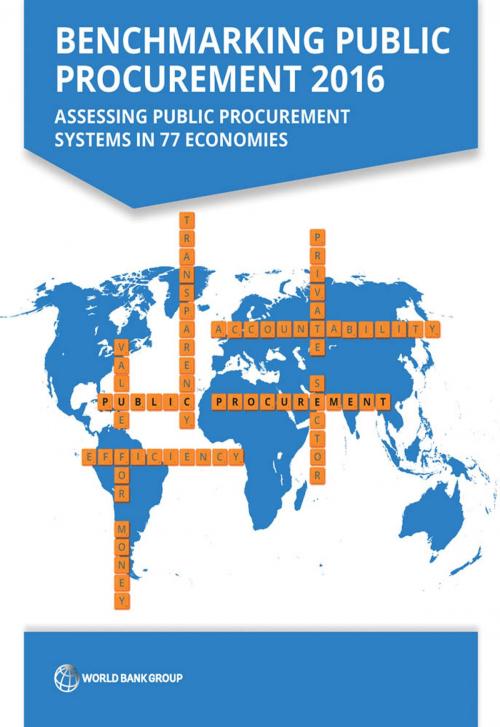Benchmarking Public Procurement 2016
Assessing Public Procurement Systems in 77 Economies
Business & Finance, Economics, Public Finance, Business Reference, Business Ethics| Author: | World Bank Group | ISBN: | 9781464807275 |
| Publisher: | World Bank Publications | Publication: | November 12, 2015 |
| Imprint: | World Bank Publications | Language: | English |
| Author: | World Bank Group |
| ISBN: | 9781464807275 |
| Publisher: | World Bank Publications |
| Publication: | November 12, 2015 |
| Imprint: | World Bank Publications |
| Language: | English |
Public procurement accounts for around one-fifth of global gross domestic product (GDP). Given its size the public procurement market can improve public sector performance, promote national competitiveness, drive domestic economic growth, and boost economic development. Launched at the request of the G20 Anti-Corruption Working Group, Benchmarking Public Procurement presents actionable indicators to help countries identify and monitor policies and regulations that impact how private sector companies do business with the government in 77 economies. The Benchmarking Public Procurement 2016 report is organized under two parts: the public procurement life cycle and the complaint and reporting mechanisms indicators. Data was gathered using standardized questionnaires distributed to expert contributors in each economy. The project builds on the Doing Business methodology and aims to promote evidence-based decision making by governments and shed light over areas where few empirical data have been presented so far.
Public procurement accounts for around one-fifth of global gross domestic product (GDP). Given its size the public procurement market can improve public sector performance, promote national competitiveness, drive domestic economic growth, and boost economic development. Launched at the request of the G20 Anti-Corruption Working Group, Benchmarking Public Procurement presents actionable indicators to help countries identify and monitor policies and regulations that impact how private sector companies do business with the government in 77 economies. The Benchmarking Public Procurement 2016 report is organized under two parts: the public procurement life cycle and the complaint and reporting mechanisms indicators. Data was gathered using standardized questionnaires distributed to expert contributors in each economy. The project builds on the Doing Business methodology and aims to promote evidence-based decision making by governments and shed light over areas where few empirical data have been presented so far.















